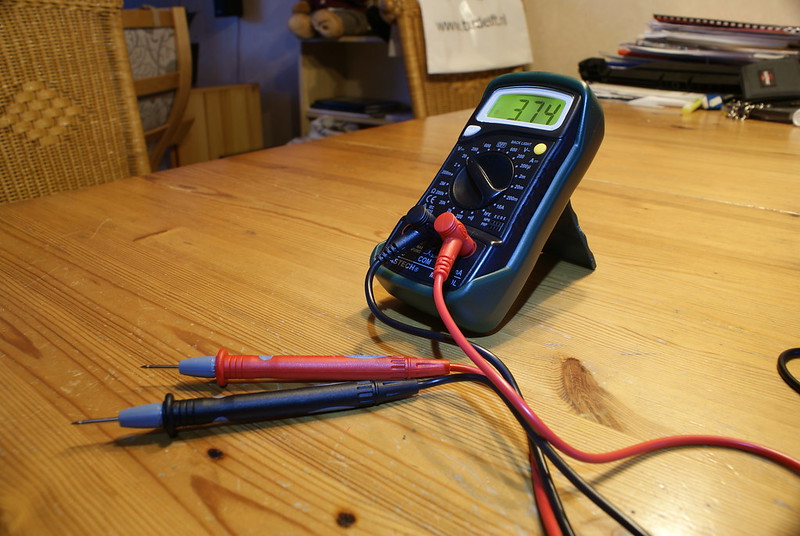Introduction
The importance of measuring electric currents and other properties of electricity can be a rather important subject for various physical science research or even for the manufacturing of certain electronic products. Therefore it is necessary to understand what the basic methods are to evaluate such electric properties.

Of course, there are various devices that can help with measuring the electronic current or their intensities but they are often separate devices that are often rather complicated to use and can be time taking to set up. That is exactly where the Multimeters come in. They are extremely portable instruments that can help in reducing various electronic properties.
What are Multimeters?
Multimeters are an extremely useful device to deduce various physical properties of electricity and even electronic devices. These properties can be quite variable and therefore it is safe to say that the multimeters provide a diverse array for their usage. It can single-handedly measure various electronic properties which otherwise will be difficult to measure without the use of separate instruments.
This feature has allowed Multimeters to become extremely popular among electronic device manufacturers and even for the servicing staff. Multimeters are small devices that can accurately deduce the voltage, resistance, and even the intensity of current from any other device. The sheer ease of accessibility and convenience has multimeters a valuable asset in hands.
Why are Multimeters used?
As mentioned previously the multimeter is a device that is widely used for its crazy good functionalities in the electronic industries. It can be extremely handy and portable and most importantly it has almost no setup operation. The sheer ease of usability is one of the main reasons why it is so popular among users of the particular industry and even for students.
The multimeter can be easily used to measure the electronic properties of any device and at least recognize two of them simultaneously. This greatly adds to the convenience of using a Multimeter for its ability to measure more than one electronic value. This convenience is also the main reason why it is so widely used as an electronic diagnostic tool for various electronic industries.
Related: 5 Reason Everyone Should own a Multimeter
Types of Multimeters
When it comes to Multimeters there are several types of Multimeters that can and are used for different electronic diagnoses. Each of them varies mostly in scale and capacity and very often in features. Some of the most common types of Multimeters are the Digital multimeters which are a fairly recent addition to the market.
Then there are the analog multimeters which are quite a widespread and mostly used multimeter type in the market. Both of these types of Multimeters are extremely similar in terms of usage and even in the field of capacity. The main difference between them is the issue of the display. The digital multimeter has an easy-to-understand display whereas the analog multimeters are more accurate at a molecular level.
Digital Multimeters
Digital Multimeters are an extremely common type of Multimeters that are used in nearly all of the electronic industries and even in the physics laboratories in schools and colleges. Of course, they vary greatly in electronic capacity and can record higher voltage or resistance when necessary.
But the main importance of digital multimeters is their extremely easy operation. Not only did they not have any setup operation but they are also extremely easy to read. This is because all of the readings are displayed in a digital manner as well. Nearly all digital multimeters are a better choice for new users to yield easy-to-read values of voltages or resistances.
Uses
The digital multimeter, much like any other type of multimeter, has a variety of uses. Some of these are :
- The digital multimeters can seamlessly measure electrical values of voltage, current, and resistances.
- The general multimeter is often used by hobbyists to measure certain electronic properties of the surrounding objects or for quality of life purposes.
- Digital multimeters are often used to measure any form of hazardous potential of the objects and help with their troubleshooting.
- The digital multimeters are also known for their default digital display which helps in easily recognizing the readings of any electronic value without involving any complications.
Pros
- They have high input capacity which ensures extremely quick results instead of prolonged loading.
- The readings recorded by the digital multimeters are completely unambiguous in nature.
- These digital multimeters are extremely portable in nature and are often much easier to use when compared to bulky analog multimeters.
- It boasts an extremely high sensitivity value which ensures accurate results for the electronic readings.
Cons
- The most prominent con of any digital multimeter will of course be its limited power source. Since most of their LCD displays are battery operated.
- The major con for these digital multimeters is their alarming price which often reduces their mass production in comparison to analogue multimeters.
- Digital Multimeters have a limited range and capacity for voltage measurements which can often yield inaccurate readings and even cause overload and personal injury.
- Their reading record is often not as accurate as the analog multimeters and may lead to minor fluctuations as well. This factor will often be a major nuisance when the most accurate reading is required.
Related: 15 Best Multimeter for Electronics & Home Usage
Analogue Multimeters
The analog multimeters are another type of popular multimeters which are used for extremely important and high-end electronic diagnoses. This is because of their extremely accurate readings and complicated handling. Without expert experience, it can be quite difficult to operate an analogue multimeter. This makes it necessary to understand why they are so popular in important electronic industries across the globe and even in the case of high-end research in the field of electronics. The analogue multimeters are extremely convenient when used properly. They provide the exact readings or mostly the best and most accurate reading possible.
Uses
There are several uses when it comes to analog multimeters because of their wide popularity across the Industry. Some of these uses are as follows :
- The analogue multimeters can be extremely useful in determining the battery power of a device which can be very handy in the electronic industries.
- The use of analog multimeters is also done to determine if any election device is susceptible to Overload as it can deduce its current electric flow effectively.
- They are often equipped with high-end capacitors and diodes which help in boosting the accuracy of the readings measured by the analog multimeters.
Pros
- The main importance of an Analogue multimeter is its extremely accurate reading measurements which are often rare in the case of digital multimeters.
- The response time of the analogue multimeters is extremely low and can almost instantly catch any fluctuations made in the flow of electricity which adds to their accuracy.
- A major feature of an Analogue multimeter is that they do not require any external power source and will operate without any batteries which makes it convenient.
- The analog multimeters also come with inbuilt overload protection which are helpful in protecting the device against any overload and adds to their longevity as well.
Cons
- A major difference between the digital and the analogue multimeters is their display. The analogue multimeters require the users to manually deduce the reading from the physical scale.
- The movement of the analogue hand is much slower when compared to the digital multimeters, especially in the case of initial readings. This makes it a bit less convenient to use in case of an emergency.
- Most analogue multimeters do not come with high-end features like digital multimeters which makes them a bit less useful in certain scenarios.
- The size of the analogue multimeters is often quite bulky which makes them less portable as well.
What is the difference?
The functional approach of both the digital and analogue multimeters are extremely similar and there is not much of a difference between them. However, some of the common differences between these two types of Multimeters are as follows :
- Analogue multimeters are bulkier and mostly for on-site operation and digital multimeters are portable.
- The Analogue multimeters have manual reading measurements whereas the digital multimeters show them off on their digital screen.
- The digital multimeters are way costlier than the contemporary analogue multimeters as well.
- The digital multimeters come with a higher array of features but the analogue multimeters are often known for their accurate readings.
Which of them is better and why?
It is extremely hard to deduce which of the multimeter is better because each of them has its fair share of usage for the most part. Both of these multimeters are termed as major instruments which are required for various electronic industries in the current market. The most important factor is their accuracy and ease of usability. Both of them can be widely used for certain purposes and they do not involve the advantages of one another with their functions as well.
Conclusion
From all the above discussion, it is already clear that the use of analog and digital multimeters both have their perks and limitations. With new innovations and ideas, the use of multimeters is rapidly growing at a quick pace which further testifies its service value and importance around the material world. Their usage depends on the ease of accessibility and a lot on the users and their preferences. The usage of these multimeters depends upon the specific situation at hand.



